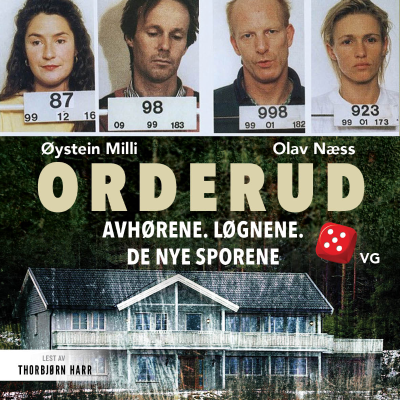
For the Love of Yoga with Nish the Fish
Podkast av Nishanth Selvalingam
Tidsbegrenset tilbud
1 Måned for 9 kr
Deretter 99 kr / MånedAvslutt når som helst.

Mer enn 1 million lyttere
Du vil elske Podimo, og du er ikke alene
Vurdert til 4,7 stjerner i App Store
Les mer For the Love of Yoga with Nish the Fish
The world of Yoga is wide and varied. In this podcast, yogi Nish the Fish shares the deeper dimensions of Yoga, Vedanta and Tantra, asking the big questions: why do we practice? What is meditation? What is the purpose of a human life? What is Beauty? What is Death? Nishanth Selvalingam studied various South Asian philosophies with his Shaivite grandfather in an ashram in Kuala Lumpur, Malaysia and moved to Los Angeles to study philosophy, teach yoga and play guitar in a rock band. Join him and special guests as they explore Yoga, in all its splendours. For more episodes and instruction, and to support this humble offering of the heart, visit me on Patreon: patreon.com/yogawithnish
Alle episoder
339 EpisoderAs part of our Navarātri celebrations, we explored some stories from the Devī Māhātmyam and contrasts them to/built up on them with some similar narratives from other Purānic Śakta texts like the Devī Bhāgavatam (i.e the Devī Gitā) to excavate some deeper meaning and significance, from a philosophical and esoteric, sādhana point of view! You'll find all our talks on Navarātri & the Devī Māhātmya, its central litany here. [https://www.patreon.com/collection/784368] Support the show [https://www.patreon.com/yogawithnish] Lectures happen live every Monday at 7pm PST and Friday 10am PST and again Friday at 6pm PST. Use this link and I will see you there: https://www.zoom.us/j/7028380815 For more videos, guided meditations and instruction and for access to our lecture library, visit me at: https://www.patreon.com/yogawithnish To get in on the discussion and access various spiritual materials, join our Discord here: https://discord.gg/U8zKP8yMrM
Congratulations on completing another 9 (or perhaps 10) nights of intense contemplation, celebration and worship of Mā! What a powerful Navarātri it's been and each time feels like the first time especially if it was, in fact, your first time celebrating! But whether you are a seasoned śākta or just now getting acquainted to the festivals and practices of the tradition, Navarātri and its central litany/liturgy, the Devī Māhātmyam remain ever fresh and ever meaningful! Anyway, at the end of the 9 nights of the Goddess, there is a festival called Vijaya Daśamī, "The Victorious 10th night" when we bask in the after glow of our worship. Essentially, we are celebrating the fact that we've been celebrating... But it's also very poignant time because Mā's image will be immersed and that is sometimes a very sad thing for some. And not only that, one can feel a little listless on this day or like there's a kind of anticlimactic feeling arising. In this talk, we discuss what Vijaya Daśamī is, from a philosophical point of view, with an inquiry into form vs formlessness and we also address some of the aforementioned feelings that can come up. Also, I launch into a sustained defense of what some might call "idol worship". Jai Mā! Śrī Durgārpanam astu! The books mentioned in this video for further study: 1. Srīmad-Devī Bhāgavatam by Swami Vijñānānanda 2. I didn't mention it in the video, but as a companion to this ^, try "The Devī Gītā" by C.Makenzie Brown 3. Devadatta Kali's "In Praise of the Goddess" (and also "Veiling Brilliance", which I forgot to mention in the video) And the Sanskrit texts to recite and contemplate as part of your Devī Māhātmya sādhanā moving forward: 1. Devī Sūkta from Rg Veda (10.125) and 2. Rātri Sūkta from Rg Veda (10.127) You'll be able to find these online quite easily but their also available in Devanāgri and translation in Devadatta Kali's "In Praise of the Goddess"! and here's the full Caṇḍi & Navarātri playlist featuring all our talks over the years (I'm trying to organize it in a way that makes sense: https://www.patreon.com/collection/784368 [https://www.patreon.com/collection/784368] Support the show [https://www.patreon.com/yogawithnish] Lectures happen live every Monday at 7pm PST and Friday 10am PST and again Friday at 6pm PST. Use this link and I will see you there: https://www.zoom.us/j/7028380815 For more videos, guided meditations and instruction and for access to our lecture library, visit me at: https://www.patreon.com/yogawithnish To get in on the discussion and access various spiritual materials, join our Discord here: https://discord.gg/U8zKP8yMrM
It's that time of the year again, gang! You know what's up. Here's the document [https://docs.google.com/document/d/1N1pEDmWZWdJq5Q27dGiZb9DQFrr1Ouq2FC85jIwQ66c/edit?usp=sharing]we were presenting in this talk: it walks you through a Navarātri sādhanā (spiritual practice) that you can do over the course of the 9 nights of the Goddess. Remember that Navarātri happens 4 times a year (and in some traditions, 8 times) and so this sādhanā can be done at least that many times but it is also a sādhanā that you can do anytime, for as long as you like. It is a profound sādhanā because it uses as its centrepiece the most powerful and beloved text of the Śākta tradition, the Devī Māhātmya which is, among many other things, a compilation of unbelievably powerful and transformative mantras! Every word of this text is mantra (or rather, vidyā in the Tāntrik sense of the word) and the sādhana which we outline in this talk will lead you directly into the text and ideally, Mā willing, enable you to access its fullest power! May Mā bless us all with fervor! PS: as supplement to all this, you'll find many videos in this Caṇḍi & Navarātri playlist [https://www.patreon.com/collection/784368]to help you flesh out this sādhanā and to keep you company during this most auspicious of festivals! This talk How To Worship Mā Durgā [https://www.patreon.com/posts/how-to-worship-126227499?utm_medium=clipboard_copy&utm_source=copyLink&utm_campaign=postshare_creator&utm_content=join_link]might be especially helpful in contextualizing Navarātri and the opportunity it presents! Jai Mā! Support the show [https://www.patreon.com/yogawithnish] Lectures happen live every Monday at 7pm PST and Friday 10am PST and again Friday at 6pm PST. Use this link and I will see you there: https://www.zoom.us/j/7028380815 For more videos, guided meditations and instruction and for access to our lecture library, visit me at: https://www.patreon.com/yogawithnish To get in on the discussion and access various spiritual materials, join our Discord here: https://discord.gg/U8zKP8yMrM
A high level talk on some of the subtle and esoteric ideas sketched out by Devī in the opening verses of the Vijñāna Bhairava Tantra. Support the show [https://www.patreon.com/yogawithnish] Lectures happen live every Monday at 7pm PST and Friday 10am PST and again Friday at 6pm PST. Use this link and I will see you there: https://www.zoom.us/j/7028380815 For more videos, guided meditations and instruction and for access to our lecture library, visit me at: https://www.patreon.com/yogawithnish To get in on the discussion and access various spiritual materials, join our Discord here: https://discord.gg/U8zKP8yMrM
In the Who Should Worship Kālī? | Dakṣiṇa Kālī vs Smaśāna Kālī [https://www.patreon.com/posts/who-should-kali-137447848] talk, we explained the technical term "jagadānanda" which describes the bliss of fullness. We argued that from the Kaula point of view, the goal is not transcendence but fullness; not freedom "from" the world but freedom "as" the world. And we pointed out how Kālī sādhanā is uniquely about embracing this non-dual totality of all things! The Absolute Reality is dynamic, ever-free Consciousness, my very own Self and the goal is to realize this in all things, as all things. Necessarily, this involves coming to terms with realities that the dualistic, conditioned and limited mind often rejects. "Who dares misery love: to him the Mother comes" etc. Then, in Kālī's Non-Duality of Radical Acceptance | vs. Classical Non-Duality [https://www.patreon.com/posts/kalis-non-of-vs-138562078] we went in with some finer brush strokes to compare the view of Classical Advaita, which we termed the "path of absolute negation" with that of Tāntrik Advaita, or the Non-Duality of Kālĩ which we described as the "path of absolute acceptance". Both can lead to non-dual realization and yet who can deny that these might be different flavors of non-dual realization! The former path is fit for some while the latter suits the disposition of others and for many, the two paths are practiced sequentially, one after another. All this we discussed in last week's talk. Now, this week, we take up this topic yet again but using the Sāmkhyan idea of the gunas to show how Kālī sādhana (i.e Tāntrik non-duality) is unique and therefore for some people, uniquely disturbing. I make a case against transcendentalists, "sattva-only" oriented traditions! Originally, I had intended this lecture to be about staying safe and grounded in Kālī sādhanā or something along the lines of a PSA on kundalini emergencies/spiritual crisis but I spent so much time describing how Kālī sādhanā uniquely leads to destabilization that I never really got around to talking about techniques for grounding! We briefly mention a few towards the end but I suspect I'll want to develop these theme on safety more next week: stay tuned! Support the show [https://www.patreon.com/yogawithnish] Lectures happen live every Monday at 7pm PST and Friday 10am PST and again Friday at 6pm PST. Use this link and I will see you there: https://www.zoom.us/j/7028380815 For more videos, guided meditations and instruction and for access to our lecture library, visit me at: https://www.patreon.com/yogawithnish To get in on the discussion and access various spiritual materials, join our Discord here: https://discord.gg/U8zKP8yMrM

Mer enn 1 million lyttere
Du vil elske Podimo, og du er ikke alene
Vurdert til 4,7 stjerner i App Store
Tidsbegrenset tilbud
1 Måned for 9 kr
Deretter 99 kr / MånedAvslutt når som helst.
Eksklusive podkaster
Uten reklame
Gratis podkaster
Lydbøker
20 timer i måneden

































